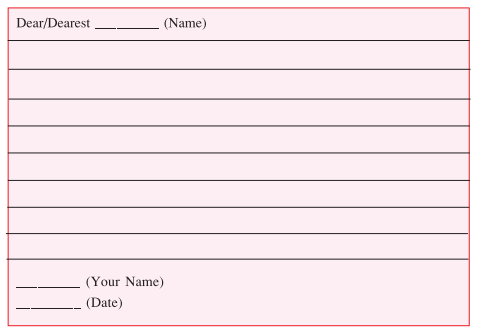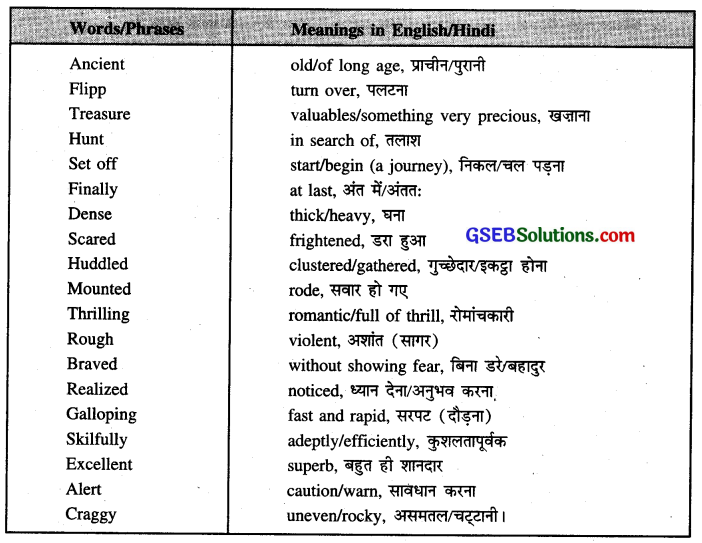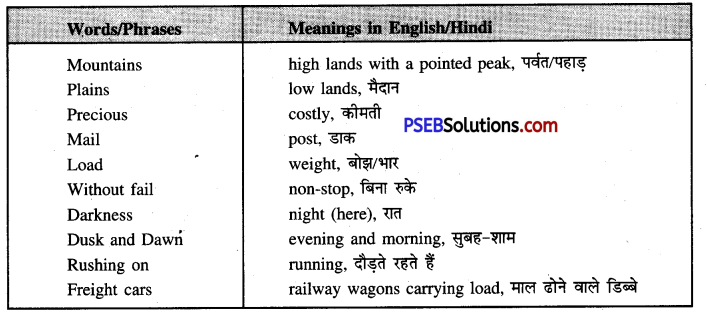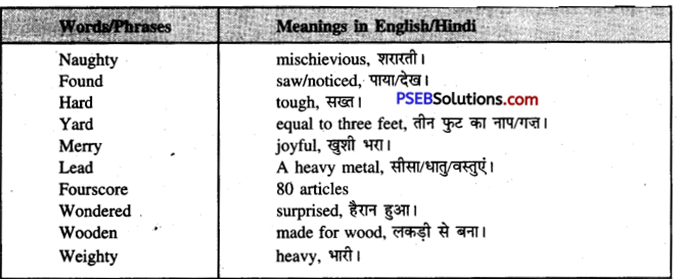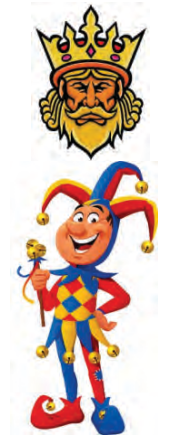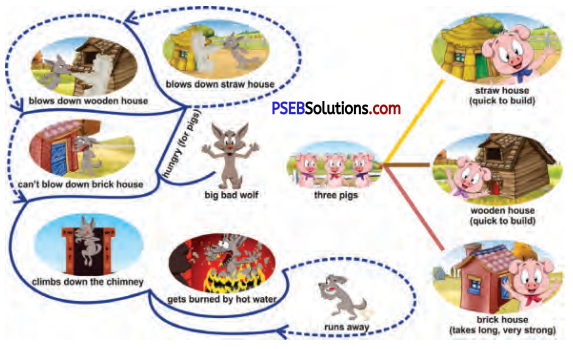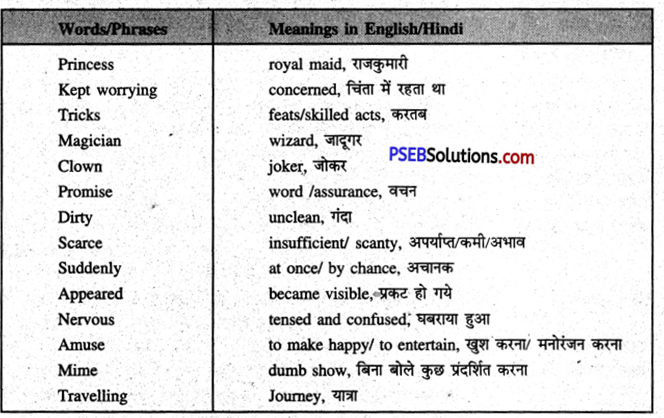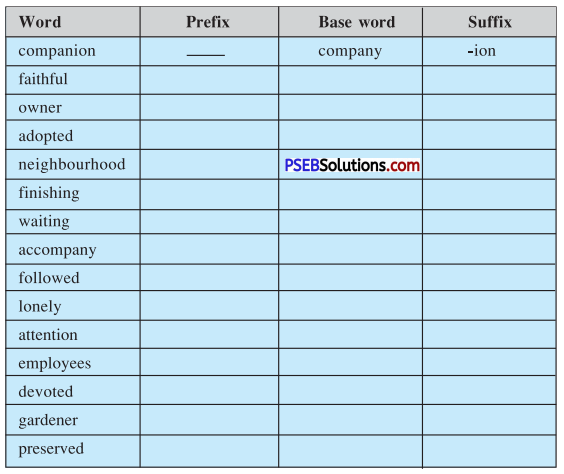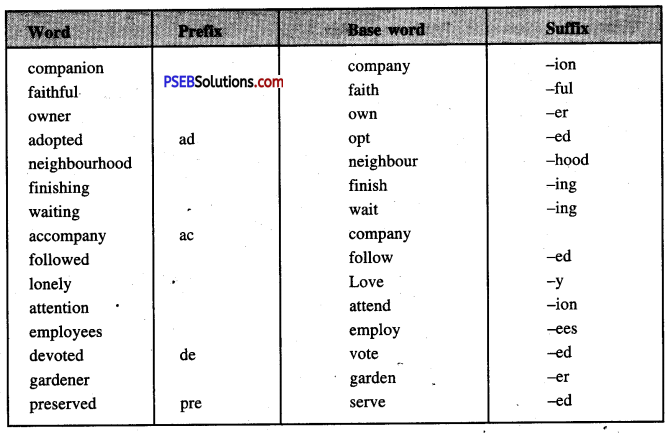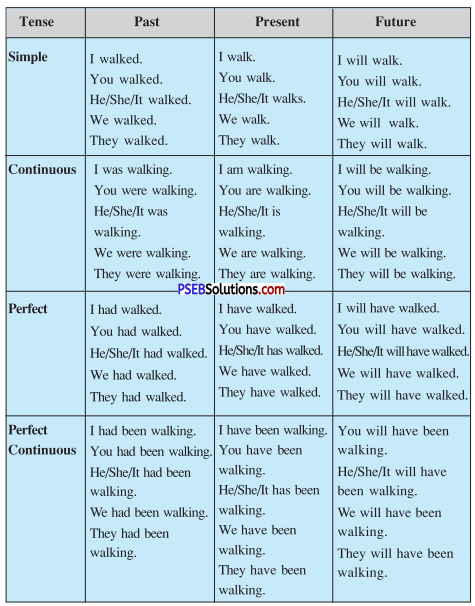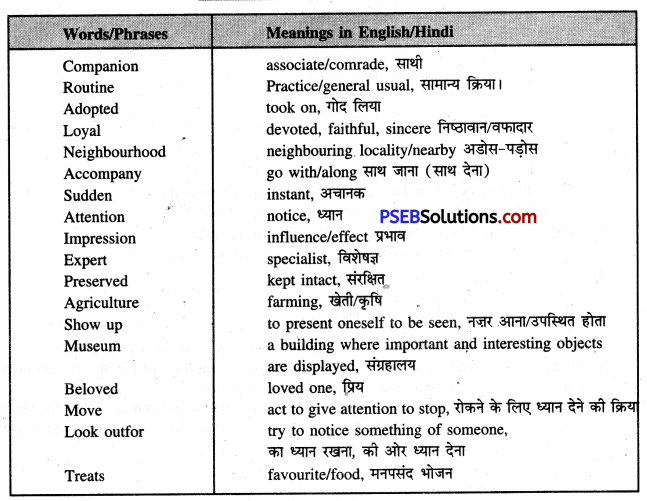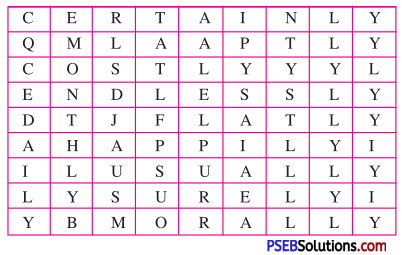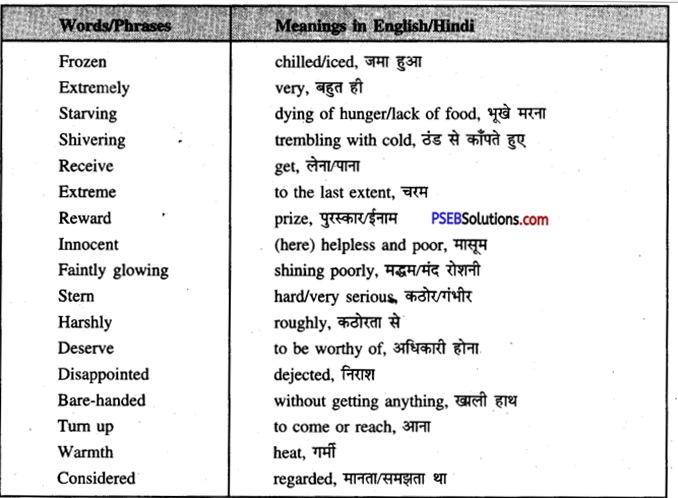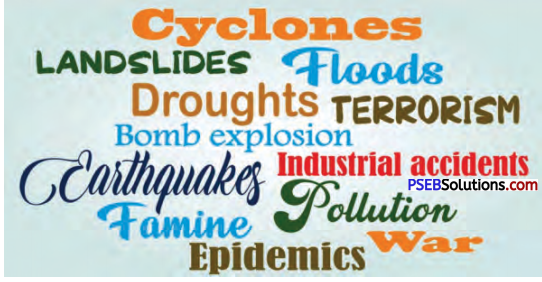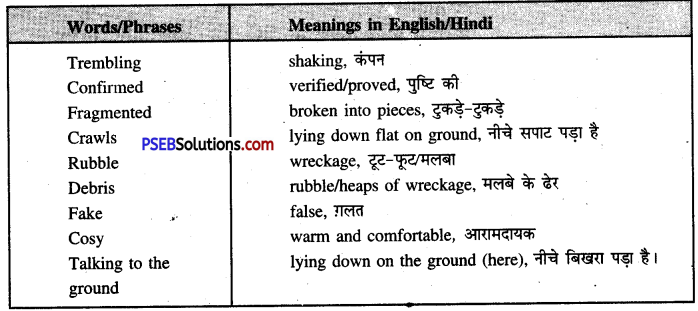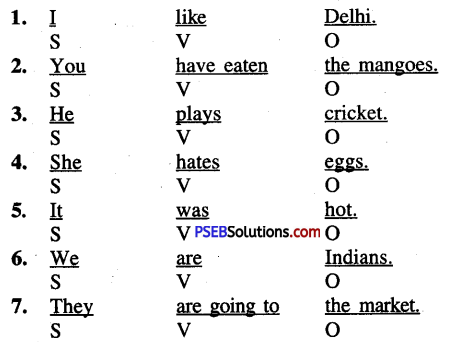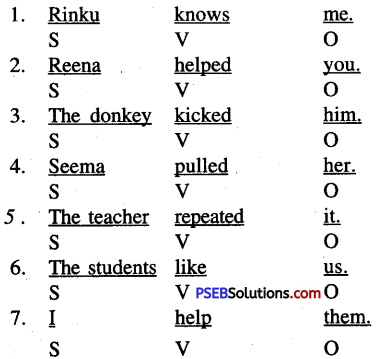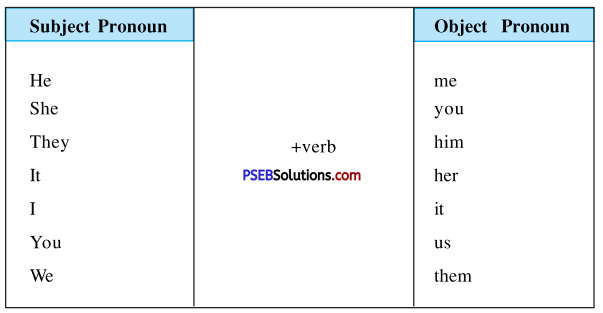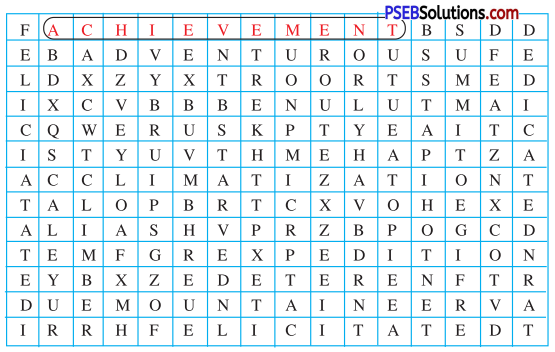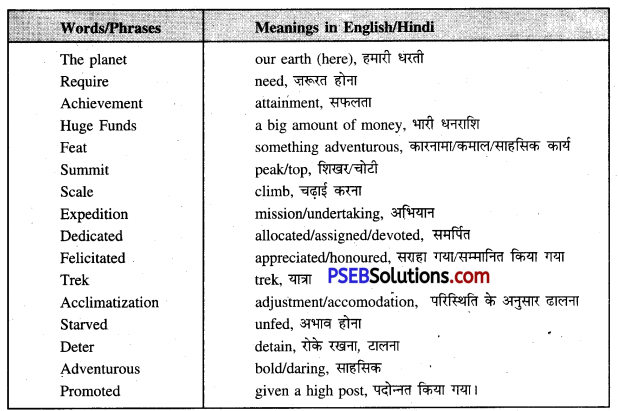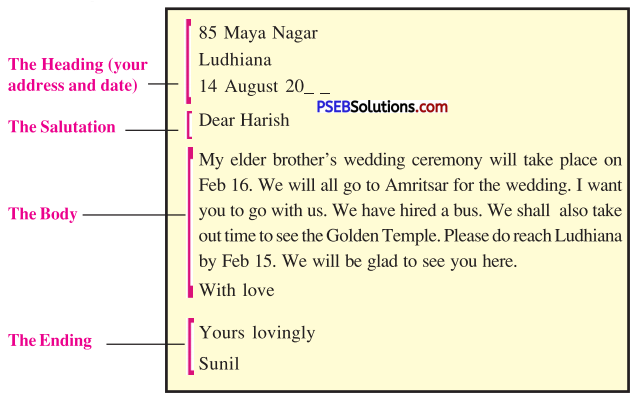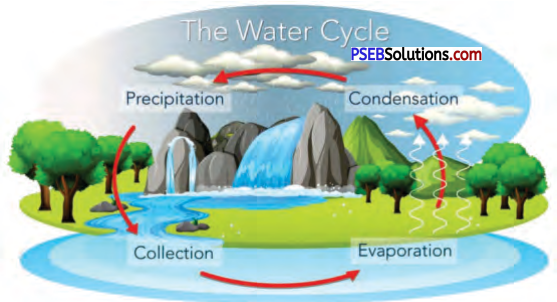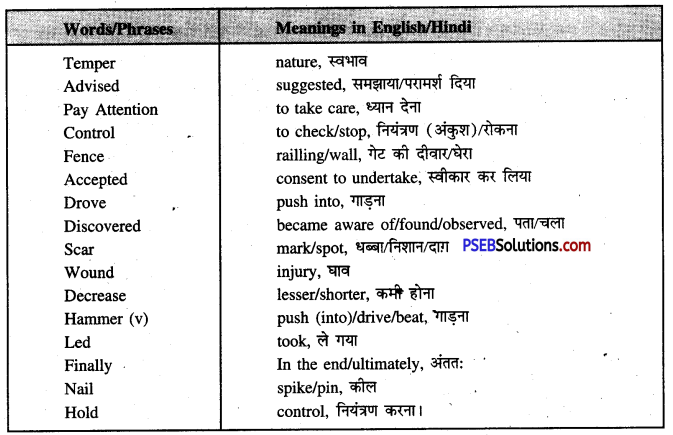Punjab State Board PSEB 7th Class English Book Solutions Chapter 3 A Glass of Milk Textbook Exercise Questions and Answers.
Class 7th English Solutions Chapter 3 A Glass of Milk Question Answers
A Glass of Milk Class 7 Questions and Answers
Activity 1.
Look up the following words in a dictionary. You should seek the following information about the words.
1. Meaning of the word as used in the play (adjective/noun/verb, etc.)
2. Pronunciation (The teacher may refer to the dictionary or the mobile phone for correct pronunciation.)
3. Words that normally go with the given word. For example, ‘owe’ goes with ‘money’, ‘bank’, ‘debt’, ‘apology’, etc.
4. Spellings
| complicated | diagnose | surgery |
| attention | struggle | discuss |
Vocabulary Expansion
Activity 2
Find suffixes in the following words.
1. complicated
2. hesitatingly
3. warmly
4. stronger
5. goodness
Answer:
1. -ated,
2. -ly,
3. ly,
4. -er,
5. ness.
![]()
Let us revise the prepositions besides’,’beside’, ‘between’ and ‘among’. ‘Besides’ means ‘in addition to’. “Beside’ means by the side of.,
1. What other sport do you play besides (के अतिरिक्त) hockey ?
2. She sat beside (के पास) her sick son all night.
‘Between (दो व्यक्तियों अथवा चीजों के बीच) is used for two people or things.
‘Among (दो से अधिक व्यक्तियों अथवा चीजों के बीच) is used for more than two people or things.
1. There is no love between the two brothers.
2. Distribute sweets among all the children.
Activity 3
Fill in the blanks choosing from the words given in the box.
| beside | besides | between | among |
1. The two brothers distributed the sweets …………………. themselves.
2. Radha came and sat ……………….. her mother.
3. The four thieves quarrelled ………………. themselves.
4. I have three other pens …………..
5. this. ……….. advising them, he gave them money also.
6. A beggar was sitting ………………. the temple gate.
Answer:
1. between
2. beside
3. among
4. besides
5. Besides
6. beside.
Learning to Read and Comprehend
Activity 4
Read the play carefully and write the answers.
Scene-1
Question 1.
Count and write the number of characters in Scene 1 of the play.
नाटक के दृश्य 1 में पात्रों की संख्या गिनो और लिखो।
Answer:
Two.
Question 2.
What are their names ?
उनके क्या नाम है?
Answer:
Howard Kelly and Anita.
![]()
Question 3.
What is the time ?
समय क्या है ?
Answer:
It is afternoon.
Question 4.
What does the boy say to himself ?
लड़का स्वयं से क्या कहता है ?
Answer:
He says that he must sell two more books to pay his school fee and ask for some water too.
Question 5.
Why does he sell books ?
वह पुस्तकें क्यों बेचता है ?
Answer:
He sells books to earn money for his school fee.
Question 6.
Why does he ring the bell ?
वह घंटी क्यों बजाता है ?
Answer:
He rings the bell to get the door opened.
Question 7.
Who opens the door ?
दरवाज़ा कौन खोलता है ?
Answer:
A lady opens the door.
Question 8.
What does he request the Lady for ?
वह औरत से किस चीज़ के लिए प्रार्थना करता है ?
Answer:
He requests the lady for some water.
Question 9.
What does the Lady give him ?
औरत उसे क्या देती है ?
Answer:
The lady gives him a glass of milk.
Question 10.
How much money does the Lady give the boy for the book ?
औरत लड़के को पुस्तक के कितने पैसे देती है ?
Answer:
She gives him 5 pounds.
Scene-2
Question 1.
Count and write the number of characters in Scene 2 of the play.
नाटक के दृश्य 2 में पात्रों की संख्या गिनो और लिखो।
Answer:
Two.
Question 2.
What is the profession of the characters of this scene ?”
इस दृश्य के पात्रों का क्या व्यवसाय है ?
Answer:
They are doctors.
![]()
Question 3.
Why had the Lady come to this hospital ?
औरत इस अस्पताल में क्यों आई है ?
Answer:
The lady had some complicated disease and had been referred to this hospital for treatment.
Question 4.
How did the Lady get ill ?.
औरत बीमार कैसे हुई ?
Answer:
The lady got ill because of food poisoning
Question 5.
What kind of treatment did she need ?
उसे किस प्रकार के इलाज की ज़रूरत थी ?
Answer:
She needed immediate surgery.
Scene-3
Question 1.
How much time did the patients get to pay the bill, as per the rules ?
नियमों के अनुसार मरीजों को बिल चुकाने के लिए कितना समय मिलता था ?
Answer:
They got two days to pay the bill.
Question 2.
Why did the Lady get worried ?
औरत चिन्ता में क्यों पड़ गई ?
Answer:
She got worried to see the heavy bill to pay within two days.
Question 3.
Why did the Lady have tears in her eyes ?
औरत की आँखों में आंसू क्यों आ गये थे ?
Answer:
These were the tears of happiness as the bill had already been paid.
Question 4.
Why did she not have to pay the bill ?
उसे बिल क्यों नहीं चुकाना था ?
Answer:
She did not have to pay the bill because Dr. Howard had already paid it.
Question 5.
Who had paid the bill ? Why ?
बिल किसने चुकाया था ? क्यों ?
Answer:
Dr. Howard had paid the bill. He had paid it to repay the goodness of the lady in the form of a glass of milk.
Question 6.
Why was the Lady happy in the end ?
अन्त में औरत प्रसन्न क्यों थी ?
Answer:
In the end, the lady was happy because her faith in God and goodness of people had become stronger.
![]()
Learning Language:
Degrees of Adjectives
Adjectives have three forms of comparison: Positive, Comparative and Superlative. Simple adjectives that make no comparisons are positive forms.
Most adjectives form the comparative by adding ‘-r’, ‘-er’, -ier’ and the superlative by adding ‘-st’, ‘-est’, ‘-iest to the positive.
Adjectives के तीन रूप (degrees) होते हैं। Positive degree आम विशेषता बताती है; जबकि Comparative तथा Superlative degrees का प्रयोग तुलना के लिए किया जाता है।
(i) अधिकतर adjectives के पीछे ‘-er’/’-ier’ तथा ‘-est’/’-iest’ जोड़ने से तथा आवश्यक परिवर्तन (विशेषकर अंतिम) करने से क्रमश: Comparative तथा Superlative degrees बनती हैं ; जैसे
| Positive | Comparative | Superlative |
| quick | quicker | quickest |
| fine | finer | finest |
| nice | nicer | nicest |
| bold | bolder | boldest |
| clever | cleverer | cleverest |
| deep | deeper | deepest |
| dirty | dirtier | dirtiest |
| heavy | heavier | heaviest |
| happy | happier | happiest |
(ii)Adverb “more” तथा “most” के प्रयोग से ; जैसे —
| Positive | Comparative | Superlative |
| beautiful courageous difficult satisfactory useful |
more beautiful more courageous more difficult more satisfactory more useful |
most beautiful most courageous most difficult most satisfactory most useful |
(iii) भिन्न – भिन्न शब्दों के प्रयोग से ; जैसे —
| Positive | Comparative | Superlative |
| good\well | better | best |
| bad | worse | worst |
| little | less | least |
| far | farther/further | farthest/furthest |
| many | more | most |
Activity 5
Complete the following sentences by choosing the correct comparative form of the words given in the brackets :
1. Australia is the ………………. island in the world. (large, larger, largest)
2. The class test was ……………… than we had expected. (easy, easier, easiest)
3. The elephant has the …………….. trunk. (long, longer, longest)
4. Kilimanjaro in Africa is ………………. than Mont Blanc in Europe. (tall, taller, tallest)
5. The white dog was the ……………… of all. (greedy, greedier, greediest)
Answer:
1. largest
2. easier
3. longest
4. talle
5. greediest.
![]()
Activity 6.
Fill in the blanks with the correct degree of comparison of the adjective. Use the adjective given in the brackets.
1. Shyam is …………… than Karan. Neil is the ……………….. of them all.
2. My room is …………….. than yours. (neat)
3. Pole star is the ………….. ….. star. (bright)
4. The sweets I ate at this sweetshop are ………………. than any other sweets I have ever eaten. (delicious)
5. Is the Prime Minister …………….. than the President ? (powerful)
Answer:
1. healthier, healthiest
2. neater
3. brightest
4. more delicious
5. more powerful.
Comparative and Superlative Adjectives
Activity 7
Rewrite each sentence below using the comparative or superlative form of the adjectives given in the brackets.
Example A : You are (tall) than me.
Answer A : You are taller than me.
Question 1.
The fish I caught is (big) than the one you caught.
Answer:
The fish I caught is bigger than the one you caught.
Question 2.
That is the (small) umbrella I have ever seen!
Answer:
That is the smallest umbrella I have ever seen.
Question 3.
She is the (pretty) girl I have ever seen.
Answer:
She is the prettiest girl I have ever seen.
Question 4.
My friend is (fabulous) than yours.
Answer:
My friend is more fabulous than yours.
Question 5.
That building is (large) than the one next to it.
Answer:
That building is larger than the one next to it.
![]()
Question 6.
Who has the (easy) job in our family ?
Answer:
Who has the easiest job in your family ?
Question 7.
Do you think a screwdriver is (useful) than a hammer ?
Answer:
Do you think a screwdriver is more useful than a hammer?
Learning to Speak
Activity 8 (Think-Pair-Share)
Think about what do you want to do to help someone ? Think of a good human value such as :
1. sharing food
2. caring for an injured animal
3. giving new clothes to the needy, etc.
Sit facing your partner. Tell your partner about it. Each pair will take 5 minutes to speak and listen to each other.
After five minutes, say what have you learnt about your partner in front of the class)?
नोट-छात्र स्वयं करें।
Learning to Write
Activity 9
Do some people, who want to sell something, ring your door-bell in the afternoons ? Do they disturb you ? How do you react ? Are you polite to them ? Most people are rude to them. Write about the time when a salesman rang a bell when you were sleeping. You can use some of the following words/phrases.
| afternoon, bell, fast asleep, woke up, salesman, selling books, pestered, offered water, angry, close the door |
Answer:
It was afternoon yesterday when a bell rang at our door. I was fast asleep. Suddenly I woke up and opened the door. A salesman with some books in his hand greeted me. He requested me to buy one. He asked for some water too. I gave him a glass of water and requested him to go away. But he stood there like a statue and went on speaking. I got irritated and angry and closed the door.
![]()
Learning to Use Language
Read the following paragraph on Blackpool :

Blackpool is a beautiful town in England. Tourists love going to Blackpool. Blackpool is situated at the seaside. The seawater of Blackpool is very salty and visibly black. That is why the town is called Blackpool. It is a place that children love going to. There is a lot that children may find amusing. There is a tall tower in the middle of the town which is also black.
Activity 10.
Write a paragraph on your village/town/city or Amritsar/Jalandhar/Patiala/Ludhiana etc.
You may talk about :
- where the place is located
- what the place is famous for
- what most people do when they visit the place.
Note : The teacher must help learners to get information about the city/ place they want to write about.
I live in Amritsar. It is one of the biggest cities of Punjab. It is holy place and a historical city as well. It is mainly known for the Sri Harmandir Sahib, the holiest shrine of the Sikhs. People from all over the world visit this place. They have a dip in the holy tank here. The Jallianwalla Bagh near this holy shrine reminds us of the martyrs of 1919. The Durgiana Mandir of Amritsar is also worth visiting.
Comprehension Of Passages
Read the following passages carefully and aswers the questions that follow each :
(1) A small and a narrow street, afternoon time, a small boy selling things from door to door.
Boy (to himself): I must sell two more books ! How will I give my school fee if I don’t sell these books ? But it is a hot afternoon ! I am so hungry and thirstly ! I think I must ask for some water from the next house!
The boy sees a small house. He rings the bell. A lady opens the door.
Boy (tired and hungry): Good afternoon, Ma’am!
Lady (politely) : Good afternoon ! Do you want something ?
Boy : My name is Howard, Howard Kelly. I am selling these books. Will you buy one of my books?
![]()
1. What was the small boy doing ?
छोटा सा लड़का क्या कर रहा था ?
2. How was he feeling ?
वह कैसा महसूस कर रहा या?
3. Choose true and false statements and write them in your note book.
(a) The street was big and narrow.
(b) The boy’s name was Howard Kelly.
4. Complete the sentences according to the meaning of the passage.
(a) I must ask for some water ……………….
(b) The boy was to pay his ………………
5. Match the words with their meanings :
| (a) ask for | softly |
| (b) politely | demand |
| quickly |
Answer:
1. The small boy was selling books from door to door.
2. He was feeling very hungry, thirsty and tired.
3.
(a) False
(b) True.
4.
(a) I must ask for some water from the next house .
(b) The boy was to pay his school fee.
5.
(a) ask for — demand
(b) politely — softly.
(2) Lady : You are very small. You should be in school and not selling things !
Boy : Yes, Ma’am. I need to pay for my fee. For this reason, I go door to door selling books. And, ah (hesitatingly) Can I get some water, please ? I am very thirsty.
The lady looks at him and says :
Lady : Sure! Just a few minutes, child. (goes inside and comes back with a glass) Here you are ! Here’s some milk. You are so weak. It appears you haven’t eaten for days !
Boy (taking the glass from the lady and drinking it) : Thank you so much, Ma’am. You are very kind ! How much, ehm… How much do I, ah… owe you for the milk ?
1. Why had the boy to sell books ?
लड़के को किताबें क्यों बेचनी पड़ती थीं ?
2. What did the Lady give the boy to drink ?
औरत ने लड़के को पीने के लिए क्या दिया ?
3. Choose true and false statements and write them in your note book.
(a) The boy appeared to be hungry.
(b) The boy asked the lady for some milk.
4. Complete the sentences according to the meaning of the passage.
(a) The Lady went inside and came back
(b) You should be in school and ……………….
![]()
5. Match the words with their meanings :
| (a) sure | reluctantly |
| (b) hesitatingly | smilingly |
| certainly |
Answers
1. The boy had to sell books to earn money for his school fee.
2. The lady gave the boy a glass of milk to drink.
3.
(a) True
(b) False.
4.
(a) The Lady went inside and came back with a glass.
(b) You should be in school and not selling things.
5.
(a) sure — certainly
(b) hesitatingly – reluctantly.
(3) Dr. Brown (facing Dr Kelly) : She is from Blackpool. The doctors there advised her to come to this hospital as they could not understand her disease.
It started with food poisoning but got complicated. Perhaps, her liver has got affected.
Dr. Kelly : What ? From Blackpool ? That’s where I come from. Where is the lady ? (Dr Brown taking Dr Kelly to the hospital room)
Dr. Brown : There she is! She needs immediate surgery. I don’t think we can do much in this case even after surgery.
Dr. Kelly (peeps into the room and sees the sleeping woman, smiles) : We must do our best ! And, I’ll do my best to save her.
Dr. Brown : Sure doctor ! We’ll make all possible efforts to save her. Do you know her ? Dr Kelly smiles again.
1. What was the problem with the lady according to Dr. Brown ?
डॉ० ब्राउन के अनुसार औरत की क्या समस्या थी ?
2. What were the two doctors ready to do for the lady ?
दोनों डॉक्टर औरत के लिए क्या करने को तैयार थे ?
3. Choose true and false statements and write them in your note book.
(a) The lady needed immediate surgery.
(b) The Lady’s problem had started with over eating.
4. Complete the sentences according to the meaning of the passage.
(a) The Lady was from …………………
(b) The doctors in Blackpool hospital …………. the Lady’s disease.
![]()
5. Match the words with their meanings :
| (a) efforts | damaged |
| (b) affected | attempts |
| instruments |
Answer.
1. According to Dr. Brown Lady’s liver was affected due to food poisoning.
2. The two doctors were ready to make all possible efforts to save the lady.
3.
(a) True
(b) False.
4.
(a) The Lady was from Blackpool.
(b) The doctors in Blackpool hospital could not understand the Lady’s disease.
5.
(a) efforts — attempts
(b) affected — damaged.
(4) Nurse (handing over the bill to the Lady) : Here is your medicine ! And, er… this is your bill. As per the hospital rules, you need to pay the bill in two days.
Lady (looking worried) : This hospital seems to be very expensive. Nurse : Yes, Madam. It is the most expensive hospital in London.
Lady (looks at the bill) : …It will take me a lifetime to pay the bill! It is signed by Dr Howard Kelly.
Nurse : Yes ! He’s very kind. He took special care of you. He’s from your city. Lady (looking interested) : Really ? Is he from Blackpool ?
Nurse : Yes, He is ! let me see your bill, Madam ! (takes the bill and looks at it, smiles) Yes, something is written on it. Did you see it?
Lady : No, let me see it again. (reads aloud with tears in her eyes). ‘Paid in full years ago with a glass of milk’. Dr Howard Kelly.
1. What were the hospital rules about payment of the bill ?
बिल चुकाने के बारे में अस्पताल के क्या नियम थे ?
2. What was written on the bill ?
बिल पर क्या लिखा था ?
3. Choose true and false statements and write them in your note book.
(a) The bill was signed by the Nurse.
(b) Dr. Howard Kelly was from Blackpool.
4. Complete the sentences according to the meaning of the passage.
(a) It is the ………………… in London.
(b) It will take me a lifetime …………..
![]()
5. Match the words with their meanings :
| (a) expensive | anxious |
| (b) worried | interested |
| costly |
Answers
1. As per the hospital rules the bill was to be paid in two days.
2. ‘Paid in full years ago with a glass of milk.’
3.
(a) False
(b) True.
4.
(a) It is the most expensive hospital in London.
(b) It will take me a lifetime to pay the bill.
5.
(a) expensive – costly
(b) worried – anxious.
Use Of Words/Phrases In Sentences
1. Understand (to know) —
I can’t understand what you want.
मुझे समझ नहीं आता कि तुम क्या चाहते हो।
2. Disease (ailment) —
Corona has spread a fatal disease.
कोरोना ने घातक बीमारी फैला दी है।
3. Complicated (complex) —
Your problem is very complicated.
तुम्हारी समस्या बहुत ही जटिल है।
4. Faith (trust) —
I have deep faith in God.
मेरा परमात्मा में गहरा विश्वास है।
5. Accept (take) —
I don’t accept money for any social service.
मैं किसी सामाजिक कार्य के लिए धन स्वीकार नहीं करता।
![]()
6. Deed (act) —
Do a good deed daily.
प्रतिदिन एक अच्छा काम (कर्म) करो।
7. Hand over (to give) —
Do a good deed daily.
प्रतिदिन एक अच्छा काम (कर्म) करो
8. Discuss (exchange views) —
Let us discuss this problem.
आओ हम इस समस्या पर चर्चा/विचार-विमर्श करें।
9. Ask for (demand) —
He asked me for some money.
उसने मुझसे कुछ पैसे मांगे।
10. Expensive (costly) —
Your shirt is very expensive.
तुम्हारी कमीज़ बहुत कीमती है।
Word Meanings:
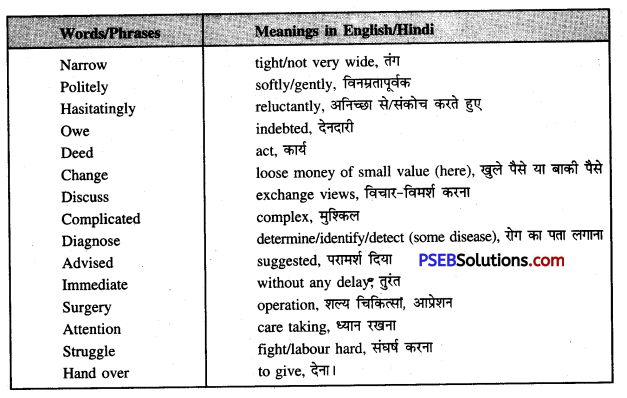
A Glass of Milk Summary in Hindi
Scene 1…………………… and feels stronger.
दृश्य-1.
समय : बाद दोपहर
स्थान : इंग्लैंड का एक छोटा सा शहर-ब्लैक पूल
पात्र : एक लड़का : हॉवर्ड केली
एक महिला : अनीता
दृश्य : एक छोटी और तंग गली, बाद दोपहर का समय, एक छोटा-सा लड़का एक दरवाज़े से दूसरे दरवाजे तक (घर-घर जाकर) सामान बेच रहा है।
लड़का (स्वयं से) : मुझे दो और किताबें अवश्य बेचनी पड़ेंगी। यदि मैं इन किताबों को नहीं बेचूंगा, तो मैं अपने
स्कूल की फीस कैसे भरूंगा। परन्तु दोपहर गर्म है। मैं बहुत प्यासा हूँ और मुझे तेज़ भूख भी लगी है। मैं सोचता हूँ कि मैं अगले घर से पानी माँग लूं।
लड़के को एक छोटा घर दिखाई देता है। वह घंटी (बैल) बजाता है। एक औरत दरवाजा खोलती है।
लड़का (थका हारा : गुड ऑफ्टरनून मैम !और भूखा)
औरत (विनम्रता से) : Good afternoon. तुम्हें कुछ चाहिए क्या ?
लड़का : मेरा नाम हॉवर्ड केली है। मैं ये पुस्तकें बेच रहा हूँ। क्या तुम मेरी कोई एक पुस्तक खरीदोगी।
औरत : तुम बहुत छोटे हो। तुम्हें स्कूल में होना चाहिए न कि कुछ बेचना चाहिए।
लड़का : हां ! मैम। मुझे अपनी फ़ीस भरनी है। इसी कारण मैं घर-घर जाकर किताबें बेचता हूँ। और, आह
(झिझकते हुए)। कृपया क्या मुझे कुछ पानी मिल सकता है ? मुझे बहुत प्यास लगी है। औरत उसकी ओर देखकर बोलती है।
![]()
औरत : अवश्य ! बच्चे ! कुछ क्षण (पल) रुको। (अंदर जाती है और एक गिलास लेकर वापिस आती है।) यह लो !
यह दूध है। तुम बहुत कमज़ोर हो। ऐसा लगता है तुमने कई दिनों से कुछ खाया नहीं है।
लड़का (औरत से : आपका बहुत-बहुत शुक्रिया मैम ! आप बहुत दयालु हैं। मुझे कितना ehm ………….. मुझे गिलास लेकर पीते हुए) कितना ah (आह) ………….. दूध के लिए मुझे कितना मूल्य चुकाना है? औरत (स्नेह से भरकर : कुछ भी नहीं ! तुम्हें मुझे कुछ भी नहीं देना। मेरी माँ ने मुझे सिखाया है कि किसी दयापूर्ण बोलते हुए) कार्य की कीमत नहीं लेनी चाहिए। मुझे तुमसे एक किताब खरीदनी है। इस पुस्तक का मूल्य
क्या है?
लड़का(मुस्कराते हुए) : धन्यवाद, मैम ! मैं इसे सदा याद रखूगा। इस पुस्तक का मूल्य 4 पौंड और 70 पैंस है। औरत पुस्तक ले लेती है और उस लड़के को 5 पौंड देकर शेष पैसे अपने पास रखने को कहती है। लड़का मुस्कराता है और उस घर से चल देता है। वह खुश है और उसे लगता है कि जैसे उसे और अधिक शक्ति मिल गई हो।
Scene 2 ………………………………….. smiles again.
दृश्य-2. (कई वर्षों के बाद)
समय : सुबह
स्थान : शहर का बड़ा अस्पताल
पात्र : डा० पीटर ब्राउन
डा० हॉवर्ड केली
(डा० ब्राउन और डा० केली एक केस पर विचार-विमर्श करते हुए)
डा० केली : डा० ब्राउन, क्या यह कठिन केस है?
डा० ब्राउन : हाँ, यह एक जटिल केस है। हम अभी तक इस समस्या को समझ नहीं पाये।
डा० केली (डा० ब्राउन : औरत कौन है? वह कहाँ से है? और वह इतनी बीमार कैसे हो गई?
के निकट आते हुए) डा० ब्राउन (डा० केली : वह ब्लैक पूल से है। वहाँ के डाक्टरों ने उसे इस अस्पताल में आने की सलाह दी है क्योंकि
की ओर वे उसकी बीमारी का पता नहीं लगा पाए। यह फूड पाइजनिंग (भोजन से जहर बन जाने) देखते हुए) से शुरू हुई लेकिन जटिल हो गयी। शायद उसका लीवर प्रभावित हो गया है।
डा० केली : क्या ? ब्लैक पूल से ? मैं भी तो वहीं से हूँ। कहाँ है औरत ?
(डा० ब्राउन डा० केली को अस्पताल के उस कमरे में ले जाते हुए)
डा० ब्राउन : यह रही, वह। इसे शीघ्र ही शल्य चिकित्सा (सर्जरी) की आवश्यकता है। मुझे नहीं लगता कि हम शल्य चिकित्सा के बाद भी इस केस में ज्यादा कुछ कर पाएं। डा० केली (कमरे में : हमें अपनी पूरी कोशिश करनी चाहिए। और मैं इसे बचाने के लिए अपना हर संभव सर्वश्रेष्ठ झांकता है और सोई हुई प्रयत्न करूंगा। महिला को देखकर मुस्कराता है) डा० ब्राउन : अवश्य, डॉक्टर ! हम इसे बचाने के लिए पूरा प्रयत्न करेंगे। क्या आप इसे जानते हो?
डा० केली फिर से मुस्कराते हैं।
Scene 3 ………………. become stronger today.
दृश्य-3.
स्थान : अस्पताल का एक कमरा
पात्र : औरत
: एक नर्स
: एक व्यक्ति (बिल विभाग से)
(नर्स औरत को दवाई देने लगती है।)
व्यक्ति (नर्स को कुछ : क्या यह अच्छा महसूस कर रही है? यह भाग्यशाली है कि इसका केस डा० हॉवर्ड केली कागज़ देते हुए) ने अपने हाथ में लिया था। यह इनका बिल है। इन्हें दो दिन में बिल का भुगतान करना है।
इन्हें बिल दिखा दो। नर्स (व्यक्ति से : तुम ठीक कह रहे हो। यह भाग्यशाली है।
और हाँ, यह पहले से बहुत अच्छा महसूस कर बिल लेते हुए) रही है और स्वस्थ है।
(नर्स औरत को दवाई देती है।) नर्स (औरत को : यह आपकी दवाई है।
और हां, यह आपका बिल है। अस्पताल के नियमानुसार आपको बिल बिल देते हुए) का भुगतान दो दिन में करना है।
औरत (चिन्तित : यह अस्पताल बहुत महंगा लगता है। दिखाई देती है)
नर्स : हां मैडम! यह लंदन का सबसे महँगा अस्पताल है।
औरत (बिल देखते : इस बिल को भरने में मेरा पूरा जीवन लग जाएगा। इस पर डा० हॉवर्ड के हस्ताक्षर हैं। हुए)
नर्स : हां। वह बहुत दयालु हैं। उन्होंने आपका विशेष ध्यान रखा है। वह आपके शहर से ही हैं। औरत (रुचि : वास्तव में ? क्या वह ब्लैक पूल से हैं? दिखाते हुए)
नर्स : हां, वह वहीं से हैं। मुझे अपना बिल दिखाओ, मैडम ! (बिल लेती है और देखकर मुस्कराती – है) हां, इस पर कुछ लिखा है। क्या आपने देखा है?
औरत : नहीं, मुझे फिर से देखने दो। (आंखों में आंसू लिए ऊंची आवाज़ में पढ़ती है।) ‘वर्षों पहले एक गिलास दूध द्वारा पूरा बिल चुका दिया गया था।’ डॉ० हॉवर्ड केली।
औरत : भगवान हॉवर्ड का भला करे। मैं बहुत खुश हूँ। आज मेरा भगवान और आदमी की अच्छाई पर भरोसा और भी मज़बूत हो गया है।
![]()
Retranslation Of Isolated Sentences
1. I must sell two more books.
मुझे दो और किताबें अवश्य बेचनी पड़ेंगी।
2. I think I must ask for some water.
मैं सोचता हूँ कि मैं पानी माँग लूं।
3. I am selling these books.
मैं ये पुस्तकें बेच रहा हूँ।
4. You should be in school and not selling things.
तुम्हें स्कूल में होना चाहिए न कि कुछ बेचना चाहिए।
5. It appears you haven’t eaten for days.
ऐसा लगता है कि तुमने कई दिनों से कुछ नहीं खाया है।
6. My mother has taught me not to accept payment for a deed of kindness.
मेरी माता ने मुझे सिखाया है कि दयापूर्ण कार्य की कीमत नहीं लेनी चाहिए।
7. The boy smiles and leaves the house.
लड़का मुस्कराता है और उस घर से चल देता है।
8. We have not yet been able to diagnose the problem.
हम अभी तक इस बीमारी को समझ नहीं पाए।
9. The doctors there advised her to come to this hospital.
वहाँ के डाक्टरों ने उसे इस अस्पताल में आने की सलाह दी है।
10. She needs immediate surgery.
इसे शीघ्र ही शल्य चिकत्सा (सर्जरी) की आवश्यकता है।
11. We will make all possible efforts to save her.
हम इसे बचाने के लिए पूरा प्रयत्न करेंगे।
12. This is her bill.
यह इनका बिल है।
13. It is the most expensive hospital in London.
यह लंदन का सबसे महंगा अस्पताल है।
14. It will take me a lifetime to pay the bill.
इस बिल को भरने में मेरा पूरा जीवन लग जाएगा।
![]()
15. Paid in full years ago with a glass milk.
वर्षों पहले एक गिलास दूध द्वारा पूरा बिल चुका दिया गया था।
16. My faith in God and goodness of people has become stronger today.
मेरा भगवान और आदमी की अच्छाई पर भरोसा और .भी मज़बूत हो गया है।
English Guide for Class 7 PSEB Prose


